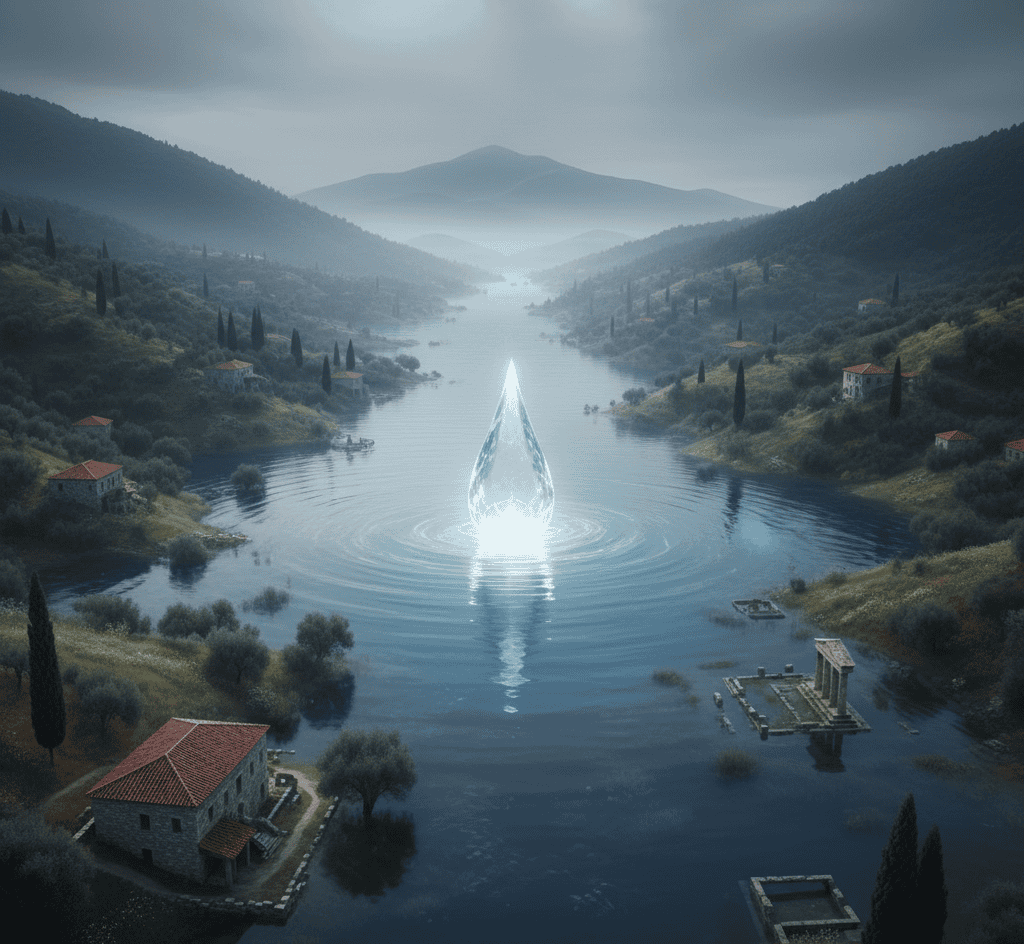In Greek mythology, water spirits were everywhere. Springs had guardians, rivers had gods, and oceans held entire families of divine beings.
Among them were the Oceanids, the daughters of Oceanus and Tethys, each tied to a body of water or an aspect of nature.
But one Oceanid stands out because her grief became so great, so overwhelming, that it reshaped the land itself.
Her tears drowned fields, swallowed homes, and carved new waterways across the earth.
This is the story of the Oceanid whose sorrow flooded an entire kingdom and why her legend still ripples through time.
A Nymph Born From Endless Waters
Oceanids were known for their grace, beauty, and deep emotional sensitivity. They carried the moods of the waters they represented.
Some remained joyful and playful, while others reflected storms and hidden depths.
The Oceanid at the heart of this tale was named Lyrana in later retellings, though ancient versions rarely name her at all.
She was tied to a gentle freshwater spring that fed a peaceful valley. Her duty was simple. She kept the water pure, cared for local wildlife, and ensured the land stayed fertile.
People often left offerings near her spring. Flowers, honey, or carved wooden figures were placed by those who hoped for a good harvest or healthy livestock.
Lyrana was known for her kindness. She protected travelers, cooled the earth during droughts, and even guided lost children to safety.
Her connection to humans made her different from the more distant sea nymphs. She cared deeply and felt deeply. And that was both her strength and her curse.
A Love That Awoke the Storm
The story says Lyrana fell in love with a mortal prince from the nearby kingdom. He was curious about the spirits of the land and visited her spring often.
The two met in secret at dawn, when mist hovered over the water.
Over time, they formed a bond both tender and tragic because everyone knew relationships between immortals and mortals rarely ended peacefully.
The prince promised to return to her after a distant campaign, but war has a way of swallowing promises. Months passed with no word.
The kingdom remained hopeful. Lyrana waited at her spring, listening for footsteps, watching for movement on the horizon.
But silence grew heavier each day. When news finally came, it arrived like a storm wind. The prince had died in battle.
For humans, this would bring mourning. For an Oceanid who felt emotion like a physical force, it became something far greater.
Her grief cracked open her nature. The calm waters she nurtured began to stir with her sorrow. And then she began to cry.
Tears That Shaped the Land
Nymphs were powerful, but their power often matched their emotional state. Lyrana’s tears carried the full weight of her heartbreak.
They fell into her spring and turned it wild. What was once a quiet pool became a rising force as if the earth itself was weeping with her.
The spring overflowed. Water rushed down hillsides. Streams burst from the ground. Rivers swelled past their banks.
Villagers fled as the flood swallowed the valley. Fields were swept away. Roads vanished.
Homes disappeared under waves of cold, churning water. The flood did not come with rage or thunder. It came with the quiet relentlessness of grief.
The kingdom begged the gods for help. Some say Hermes was sent to calm her. Others claim Persephone visited her in a vision.
But nothing worked. Lyrana wept until a lake formed where the valley once stood.
In one version of the myth, she became part of the lake itself, her spirit sleeping beneath the waters.
In another, she pulled herself away from the mortal world forever and retreated into the deep ocean, leaving her spring behind as a memory of a love that drowned a land.
The Kingdom That Learned From the Flood
Though the flood destroyed much, Greek myths never leave tragedy without a lesson. The people who survived told stories about Lyrana for generations.
Her lake became a sacred spot. No one would fish there or draw water from its deepest parts.
They believed disturbing its surface could awaken her sorrow again. Priests built a shrine near the shore to honor both the prince and the Oceanid.
Travelers lit candles to show respect. Farmers left offerings so the waters would remain calm. The myth even served as a warning to future rulers.
Kings would often consult priestesses before going to war, afraid that another divine spirit might break under the weight of loss.
Above all, Lyrana’s story taught that grief could be as powerful as any storm. Water nourishes life, but it can also take life when its balance is disrupted.
Why Lyrana’s Story Still Flows Through Time
Today, her name is not as famous as those of the major gods, but her tale survives in the soft corners of Greek folklore.
It reminds us that even gentle beings can unleash great forces. It shows how love, even when pure, can carry consequences far beyond what anyone expects.
And it highlights the common theme woven through myths everywhere. The world is shaped not only by battles, thunderbolts, or heroes but by emotion itself.
Lyrana’s flood was not born from anger. It was born from a heart too full, a loss too heavy, and tears that refused to stop.
In that way, she remains one of the most human of all divine beings. Her story lingers like ripples after a stone touches water. It is quiet, steady, and impossible to forget.

Siempre sentí una fuerte conexión con lo Divino desde mi nacimiento. Como autora y mentora, mi misión es ayudar a los demás a encontrar el amor, la felicidad y la fuerza interior en los momentos más oscuros.






